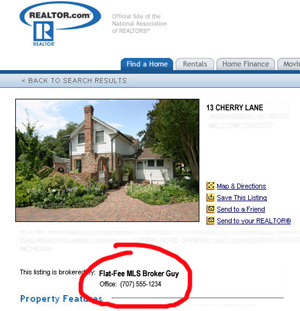







 |
When
shopping for real estate, my heart soars when I see a dirty
kitchen or smell a grungy carpet. Such houses normally sell at a
discount, and it usually doesn't take much to spruce them up.
I
also like FSBO properties. As I'll explain in the Buyers'
Agents chapter, it's easy to buy them without going
through a buyers' agent and many sellers are willing to drop the sales price by
2-3% if they're spared the expense of paying that commission. That comes to a $10,000-15,000
savings on a $500,000 house.
You
can get a commission rebate on non-FSBO properties in many states
if you do some of the legwork yourself. But be
careful. The simple act of visiting an open house or model
home could jeopardize your ability to get a rebate worth
thousands of dollars. See my buyers' website,
CapturetheCommission.com
to learn more.
Where to get information about properties for sale
I recommend that you don't visit a real estate office until
you've done some research on your own. A buyer's agent will likely
get your name and phone number, give you a map and a printout of
available properties in your price range, and offer to show them to
you. But as I explain in the Buyers'
Agents chapter, accepting help can cost you thousands of
dollars. I recommend that you first check out some alternative sources of information:
- Realtor.com
- Homepages.com
- FSBO
websites
- Regional
Multiple Listing Service (MLS) sytems.
These often provide more information than Realtor.com. See my resources
section for a directory of MLS websites that the public can search,
listed by state.
Some real estate agents offer online access to the local MLS
database, but you have to register to access this information.
If you register, expect to get a lot of phone calls.
 |
Since
real estate agents are in the business of selling information,
they're understandably reluctant to give it away for free.
Fortunately, you can uncover a lot of information yourself by doing
research on the Internet and by visiting open houses. |
- Classified
ads in the newspaper.
- Online
classified ad services, like Craigslist.org,
backpage.com, livedeal.com,
base.google.com, and propsmart.com.
- Breakfast
meetings for real estate agents. Many local realtor
associations arrange weekly breakfast meetings during which agents
present their new listings. They're open to the public, but
hardly anyone outside of the real estate business seems to know
about them. Expect to pay $5 or so for coffee and sweet rolls,
and then go sit in a quiet corner where you won't attract too much
attention.
- Drive
around. You can sometimes find FSBO houses just by driving
through neighborhoods. A lot of homes also have open houses on
Sunday afternoons--you can often find them just by looking for
signs.
- Craigslist.org.
This is an online classified ad service.
 |
The
National Association of Realtors (NAR), which controls Realtor.com,
won't allow listings to reveal a FSBO seller's identity
to the public. There's a reason for this.
Knowledgeable buyers who know a property's being sold FSBO will
simply cut realtors out of the transaction. Realtors stand
to lose (and buyers to gain) thousands of dollars if they
succeed. |
Visiting open houses or model homes
You
run a big risk
when you visit open houses or model homes that aren't FSBO: the
agent on duty could argue that he or she "showed" you the
house and is therefore entitled to all or part of the buyer's agent's
commission. See my website
www.CapturetheCommission.com to learn more.
FSBO
open houses are usually safe to visit, but sometimes FSBO sellers
make the mistake of allowing agents to host their open houses.
If this is the case, leave the open house immediately and call the
seller later to schedule a personal showing.
Watch out for downward-spiraling neighborhoods
As foreclosures have
increased, many of the homes on the market in certain states are being
sold by banks. Called "bank-owned" or "REO" (real estate owned),
these properties are often priced to sell quickly.
But be careful.
When lenders sell repossessed homes at fire-sale prices, it tends to
push down property values. As a result, more homeowners in that
area can become "upside-down" on their loans, and owe more than their
properties are worth. That makes it harder for them to refinance
their loans if circumstances change and they can't make their payments.
So more of them can get pushed into foreclosure, which leads to more
bank-owned properties in that area, which leads to still lower property
values and still more foreclosures.
You don't want to buy in
an area that's in that kind of downward spiral. Before buying, go
to a website like
Foreclosures.com to see if there are lots of REO or pre-foreclosures
in your target zip code. If there are, it may be best to wait
until prices stabilize before buying.
Good questions to ask sellers
- Ask if anything's wrong with the house.
- If the home is in an
area prone to natural disasters, ask
the seller for a C.L.U.E.
(Comprehensive Loss Underwriting Exchange) report for the house.
This lists all insurance claims that have been made on the house for
the past five years.
- Ask
if there are any problems with neighbors.
- Ask what
upgrades or remodeling the sellers have done since they purchased
the home. You'll be able to use that information later to tweak
any online appraisals you get of the property (through, say, Zillow or
Ditech).
- Ask to see utility
bills for the past year.
Additional
research
- Sperling's
Best Places is a good source of information about crime rates,
schools, weather, and so forth.
- Find
out how long the property's been on the market. If it's an old
listing, you may be able to get a good deal. One way to find
this out is to look up the property on a local
MLS directory (see my resources section
for a list of these), which often gives the date the property was
first listed. Alternatively, you could ask the agent or
seller, or look at the MLS listing number on Realtor.com and see how
it compares with the numbers of more recent listings. Be wary,
though, since agents sometimes relist properties in order to make
them look fresher.
- Talk
to neighbors.
-
GreatSchools.net ranks
school districts in different areas.
- In California,
visit the
Megan's Law website to
see if any registered sex offenders live nearby
- If
you're buying land, go to the county planner and discuss zoning
restrictions on the parcel.
- Call
an insurance company to verify that the home is
insurable.
- If
the home is governed by a homeowners association (HOA), ask about
monthly fees and CC&Rs.
If you're buying a condo or cooperative unit, ask to see the
association's legal and financial documents.
-
Walkscore.com scores the "walkability"
of a neighborhood by seeing how close homes are to stores,
restaurants, and public transit.
- Download
parcel maps and other deed information from websites. In many
western states, you can find a treasure trove of information at netronline.com
for $3 each.
 |
Before making an offer on a house, I like to
stroll through the neighborhood. I invariably find one or two
neighbors outside doing gardening or unloading groceries. They almost always give me useful
information. |
Next topic: Buyers'
agents
ŠLori
Alden, 2008. All rights reserved.
|
 |